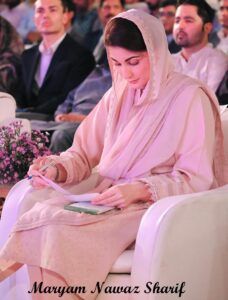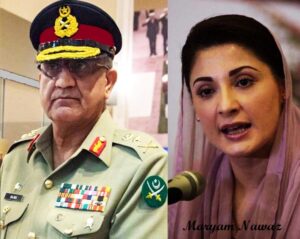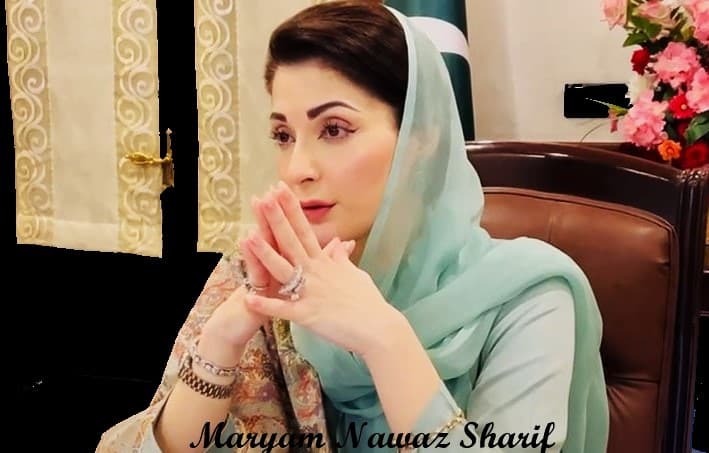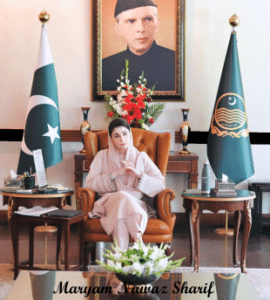Introduction of Maryam Nawaz Sharif
Maryam Nawaz Sharif, born on October 28, 1973, in Lahore, Pakistan, is the daughter of former Pakistani Prime Minister Nawaz Sharif and Kalsoom Nawaz. Coming from one of the most prominent political families in Pakistan, her father Nawaz Sharif has served as the country’s prime minister on three separate occasions (1990–93, 1997–99, and 2013–17). Her family background meant that she was surrounded by politics from an early age, leading to her eventual entry into the political sphere.
Maryam is often described as a “political heir” of her father, symbolizing the continuation of the Sharif political dynasty. Her maternal grandfather, Muhammad Sharif, was a businessman who established the Ittefaq Group, a large industrial conglomerate. The Sharif family’s wealth and influence helped solidify their political stature in Pakistan.
Educational Background
Maryam Nawaz Sharif pursued her early education in Lahore and later completed her bachelor’s degree in English Literature from Punjab University. She was briefly enrolled in a Ph.D. program at Cambridge University but returned to Pakistan due to family commitments. Her academic endeavors, while overshadowed by her political rise, reflect a disciplined and focused personality.

Personal Life
In 1992, Maryam Nwaz Sharif married Muhammad Safdar Awan, an army captain at the time. Together, they have three children: Junaid, Mehrun Nisa, and Mahnoor. Junaid, her eldest son, has been noted to follow in the political footsteps of his mother and grandfather. Her marriage to an army officer, at a time when her father was at odds with military leadership, also highlighted the complex relationship between the Sharifs and Pakistan’s military establishment.
Entry into Politics
Maryam’s formal entry into politics came in the early 2010s, but her political involvement began long before that. She played a significant role in managing her father’s political campaigns, especially during his periods of exile and legal challenges. Her leadership in her father’s election campaigns earned her recognition as a strategic and dynamic leader within the Pakistan Muslim League-Nawaz (PML-N) party.
In 2013, Maryam Nawaz Sharif officially joined the PML-N and took on an increasingly important role. That year, she was appointed the chairperson of the Prime Minister’s Youth Program, an initiative aimed at providing employment opportunities and financial support to young Pakistanis. This position was seen as a stepping stone for her political career, allowing her to engage directly with the public while promoting her father’s government policies.
Legal Battles and Scandals
Maryam’s political career has not been without controversy. In 2016, her name surfaced in the Panama Papers, a major global leak that implicated various politicians and public figures in offshore wealth holdings. The papers alleged that Maryam and her brothers owned expensive properties in London through offshore companies. The revelations led to a legal battle that culminated in the disqualification of Nawaz Sharif as prime minister in 2017.
Maryam Nawaz Sharif was accused of submitting forged documents during the investigation into the Panama Papers case, resulting in a conviction in 2018. She and her father were both sentenced to prison, but their sentences were suspended on appeal, allowing them to be released on bail.
The legal challenges did not deter Maryam Nawaz Sharif from continuing her political journey. Instead, she became more vocal, criticizing the judicial and military establishments, which she believes have played a significant role in influencing political outcomes in Pakistan. Her bold stance against these institutions has earned her both admiration and criticism.

Political Ideology and Leadership Style
Maryam Nawaz Sharif has emerged as one of the most influential female leaders in Pakistan’s political landscape. Her leadership style is often compared to that of Benazir Bhutto, the former prime minister of Pakistan and a political rival of the Sharifs. Like Bhutto, Maryam has faced personal and political adversity but has used these challenges to strengthen her political position.
Maryam Nawaz Sharif”s ideology aligns with the traditional views of the PML-N, which advocates for free-market policies, infrastructure development, and a pro-business approach. However, Maryam has also pushed for reforms in governance, accountability, and a stronger stance against the military’s role in politics. She has repeatedly emphasized the importance of democratic institutions and the rule of law in Pakistan.
One of Maryam’s key political strategies has been her ability to connect with the public, especially women and young voters. She has utilized social media to build a direct line of communication with her supporters, a move that has modernized the PML-N’s outreach efforts.
Challenges and Criticism
Despite her growing popularity, Maryam Nawaz Sharif has faced significant challenges. Her critics often point to her lack of political experience compared to other leaders in Pakistan. Additionally, the legal controversies surrounding her and her family have raised questions about her credibility and commitment to transparency.
Moreover, Maryam’s strong stance against the military establishment has made her a polarizing figure. While her supporters view her as a symbol of resistance against military interference in politics, her detractors accuse her of being confrontational and undermining national institutions.
Recent Developments
In February 2024, Maryam Nawaz Sharif reached a significant milestone in her political career by becoming the Chief Minister of Punjab, Pakistan’s most populous province. This role solidified her position as one of the top leaders in the country and set the stage for a potential future as the prime minister of Pakistan. As the Chief Minister of Punjab, Maryam has focused on improving infrastructure, healthcare, and education, while also promoting economic development in the region.
Maryam Nawaz Sharif tenure has been marked by a push for social reforms and increased investment in public services, which have been central to her political vision. Maryam Nawaz Sharif has also continued her advocacy for women’s rights and youth empowerment, key pillars of her political platform.

Relationship with the Military
The relationship between the Sharif family and Pakistan’s military establishment has always been complex. Nawaz Sharif’s repeated ousters from power were often attributed to his strained relations with the military. Maryam has adopted a similar confrontational approach, openly criticizing what she sees as undue military influence in Pakistan’s political affairs.
Her public criticism of the military has earned her respect among those who advocate for civilian supremacy but has also made her a target for those who believe that the military plays a stabilizing role in Pakistan’s governance. Maryam’s challenge lies in navigating this delicate relationship as she seeks to consolidate her political power.
Conclusion
Maryam Nawaz Sharif’s political journey is one of resilience, ambition, and determination. From her early involvement in her father’s political campaigns to becoming the Chief Minister of Punjab, she has steadily built her own political identity. While her career has been marked by legal controversies and challenges, she has emerged as one of the most influential and charismatic leaders in Pakistan’s political arena.
Her leadership in the Pakistan Muslim League-Nawaz has breathed new life into the party, making it more appealing to younger voters and women. As she continues to rise in prominence, Maryam Nawaz Sharif remains a key figure in Pakistan’s political future, with many speculating that she could eventually follow in her father’s footsteps and become the prime minister.
Maryam’s political narrative, however, is still unfolding. With a mix of support and opposition, her ability to navigate the complex political landscape of Pakistan will determine whether she can achieve her ultimate goal of leading the country. In the coming years, her leadership will be tested as she seeks to balance the demands of governance, public expectations, and the ever-present influence of Pakistan’s military establishment.

